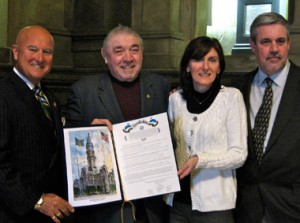
Liz and Pearse Kerr, at right, with Pennsylvania Supreme Court Justice Seamus McCaffrey at far left, and AOH National President Seamus Boyle with the city council resolution. Photo by Sarah Emenheister.
When Ancient Order of Hibernians (AOH) National President Seamus Boyle formally accepted a copy of Philadelphia City Council’s resolution calling for a united Ireland last week, it was a personal triumph for Jenkintown’s Liz Kerr and her husband, Pearse.
Each AOH division has an officer whose job it is to keep the dream of a united Ireland alive, and Liz Kerr is the Freedom for All Ireland officer for Ladies AOH Brigid McCrory Div. 25. The provision of the 12-year-old Good Friday Agreement–which brought peace to Northern Ireland and paved the way for the two Irelands to be rejoined– is never far from her mind. And there are things her husband of 28 years, Pearse, can never forget.
At the age of 17, Pearse Kerr was pulled from his home and held in a Belfast prison without being charged—legal in the 1970s under the Special Powers Act. Kerr, who suffered a broken wrist and rib while in custody, was released after the US Congress intervened: Pearse Kerr, his jailers learned, was an American citizen, born while his Irish parents lived in the US.
“So you can imagine why this issue is so close to our hearts,” says Liz Kerr. Both the city and national AOH pursued the resolution, turning to Councilman-at-large James Kenney to draft it; all 17 council members co-sponsored and voted for it in December.
“It really grew out of the Irish American Unity Forum that was held this summer in New York,” says Kerr. Hosted by Sinn Fein’s Gerry Adams, the event drew 700 participants, including representatives from dozens of Irish-American organizations, activists, and representatives of both the Irish and British governments who talked about what form a united Ireland might take.
One directive every group walked away with was to mobilize grassroots support in the US and ultimately internationally to end the partition “the same way the Sullivan principles brought down apartheid,” says Kerr. The Sullivan principles, an effort to put economic pressure on South Africa to end state-sponsored segregation, were introduced by Philadelphia minister, the Rev. Leon Sullivan. In the 1980s, more than 125 American businesses with operations in South Africa agreed to withdraw their divisions and investments until apartheid laws were appealed.
In this case, says Kerr, the AOH and other groups are working “city by city, group by group” to encourage American lawmakers to adopt resolutions similar to the one Philadelphia passed. “I think what really made the council pass it unanimously is that this is the 20-year anniversary of the Berlin Wall coming down and it’s been 20 years since South Africa abolished apartheid and they recognized that the separation of the two Irelands is just another artificial boundary that has to come down,” she says.
So far, San Francisco, Syracuse, and Cleveland have adopted united Ireland resolutions. “We’ve met with the Pittsburgh AOH and they’re actively working on it there,” says Kerr. “We really need to work on New York, Chicago, and Boston” which have large Irish-American populations.
Kerr, whose grandparents came from Galway, met her husband after reading about his ordeal in the newspaper. After his prison experience, he moved to the US to live with relatives in the Philadelphia area. “He was my high school history project at Cardinal Dougherty,” she explains. “He came to my current events class and talked about what he went through. I got an ‘A,’” she laughs.
